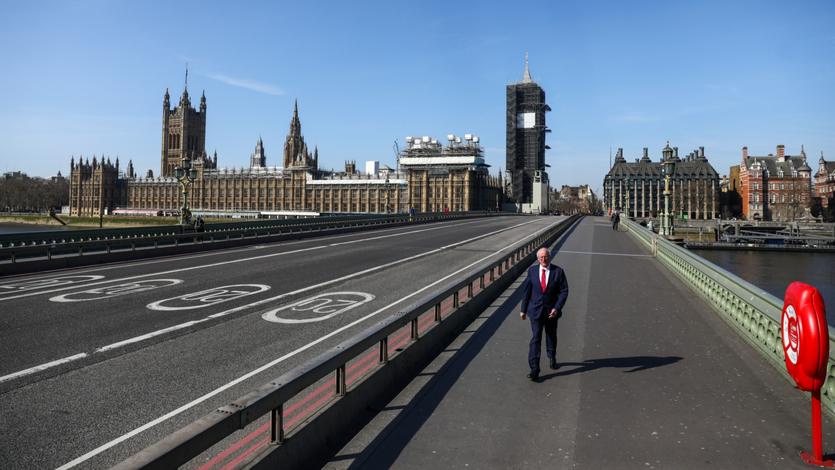 A businessman walks along a Westminster Bridge in view of the Houses of Parliament in London, UK, March 24, 2020. (Simon Dawson / Bloomberg)
A businessman walks along a Westminster Bridge in view of the Houses of Parliament in London, UK, March 24, 2020. (Simon Dawson / Bloomberg)
London needs to have its own identity after the United Kingdom's exit from the European Union, says Allen Simpson, managing director of London and Partners, the city's international trade, investment and promotion agency.
"London is an interesting city; we are almost uniquely global," Simpson told China Daily.
"We are one of history's global cities and we have been a city which has been shaped at every stage of our history by partnerships around the world and by immigration and people around the world coming and setting up businesses and families in London."
London is increasingly looking toward Asia, and in particular China, as a core economic and social partner, he said.
London is increasingly looking toward Asia, and in particular China, as a core economic and social partner, he said
Nearly 150,000 jobs in London are supported by Chinese investment, he said, and it is vital to maintain the important trend of the past 20 years of building close ties with China.
One aim for London and Partners is to continue attracting talent, especially young Chinese companies, to the city.
READ MORE: Brexit deal starts to hit food supply chain in EU
Simpson believes that in the next five years, London has the opportunity to become the global partner for Chinese international investment.
"The Chinese import market is evolving from being goods-led to services-led, and clearly London has the world's dominant global services market across banking, insurance, accountancy and law, but also new emerging models like fintech, regtech, insurtech, edtech," said Simpson, referring to the digital technologies underpinning shifts in a range of sectors.
"I think London can establish itself as China's core partner to Chinese imports."
London is the leading destination for Chinese foreign direct investment in Europe, with 142 projects in the past 10 years, meaning 8.3 percent of Chinese projects in Western Europe since the start of 2010 landed in London.
ALSO READ: Brexit divisions still running deep
Over the same time, by contrast, Paris attracted 87 projects, or 5 percent of Western Europe projects, according to a 2019 foreign direct investment markets report by the Financial Times.
The pandemic has hit tourism in the UK hard, with many flights suspended and quarantine also hindering travel, but Simpson is confident tourism and travel will bounce back, after looking at previous health crises and their aftermath.
"I'm very confident that tourism will come back very quickly and I think the key is for us to give visitors from China and elsewhere confidence that London is a safe place to visit," he said.
Global hub
According to VisitBritain, the UK's tourism body, China was the 22nd largest inbound source market for the country in 2018, and the 10th biggest for spending.
London is also widely recognized as a global hub for financial technology, popularly known as fintech, and as a leading financial center, and Simpson said this will remain the case post-Brexit, adding that the capital has a lot more to offer compared with other cities.
He noted that London is a creative and culture hub that also has high-caliber regulators that have overseen a so-called sandbox of fintech regulatory development in the past.
"From my perspective that is the basis of London's resilience but it is also the basis of London's future growth, ... it is not going to be enough anymore for a city to have one strength," he said. "The success of cities in the next generation will be defined by how they are able to bring people together from around the world. It is that connectivity and network that will define London's success, particularly in fintech."


